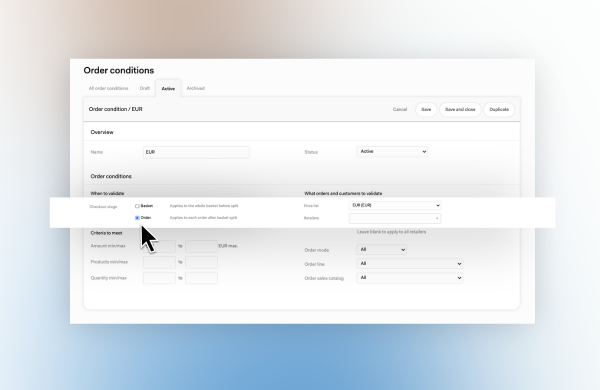05/08/2025
Industry
ERP integration is one of the most critical — and misunderstood — components of a brand’s wholesale operations. When done well, it creates a seamless connection between your internal systems and your sales channels. When done poorly, it leads to friction, delays, and, in many cases, a complete breakdown in trust.
And unfortunately, many brands know the second scenario all too well.
Whether you're working with a legacy platform or a new-generation tool that promised “plug-and-play,” the truth is that ERP integration is rarely simple — and the real issue isn’t complexity. It’s the lack of accountability, clarity, and support throughout the process. So, what does effective integration actually look like? Why do so many platforms fail to deliver? And how can switching to LE NEW BLACK help?
1. Why ERP Integration Matters More Than Ever
Your ERP system is the operational brain of your brand — housing essential product information, pricing, stock levels, and customer data. But without a properly integrated B2B platform, wholesale often becomes an operational burden rather than a growth lever.
Picture this: your sales team spends hours copying data from PDFs into spreadsheets, double-checking pricing inconsistencies, or reconciling orders between platforms. Orders that should be instant take days. One error in the size grid costs you a full season with a key account.
True ERP integration changes that. It ensures:
-
The right products appear in the right assortments at the right time
-
Buyers see accurate inventory and confirmed pricing
-
Orders flow cleanly from the platform into your internal systems, with no re-entry or duplication
In an industry where speed and precision are crucial, ERP integration isn’t just a technical convenience — it’s a competitive requirement.
2. What “ERP Integration” Often Really Means — and Why That’s a Problem
If you’ve been promised “seamless ERP integration,” you’re not alone. It’s one of the most common selling points used by wholesale platform providers. But too often, it turns out to mean something very different in practice.
In some cases, the integration is API-only — available in theory, but unsupported in practice. In others, the process stalls because no one has taken ownership of the data mapping, the sync logic, or the testing plan. Whilst integration is commonly charged for on top of a regular subscription fees, brands often find that months later, the integration that they have already paid for still hasn’t launched.
It’s not unusual for wholesale managers to quietly revert to manual workarounds, just to keep things moving.
This disconnect doesn’t just waste time — it damages internal confidence. Sales teams lose trust in the tools they’ve been given. Operations teams grow frustrated. And the promised efficiency never materialises.
Integration shouldn’t feel like an unsolvable puzzle. It should feel like progress.
3. Six Questions to Ask Before Accepting Any ERP Integration Proposal
If you’re in the process of evaluating a wholesale platform, or already experiencing delays with your current provider, these six questions can help uncover whether an integration is truly viable — or just a theoretical promise.
-
Is this integration pre-configured, or will it need to be custom-built?
Some platforms claim to support your ERP but haven’t actually implemented it before. -
Who leads the integration project: your team, or theirs?
Too often, the responsibility falls back onto the brand, with no guidance or accountability. -
Do you provide a technical contact or project manager during setup?
Integration success depends on having a team that understands both fashion workflows and technical architecture. -
How do you handle limited ERP data (e.g. 1 image instead of 8, no translations, or missing categories)?
A strong wholesale platform should support manual enrichment where needed — not force a compromise on brand presentation. -
Will we have clear testing phases and sign-off checkpoints?
Integration should be measurable — with timelines, milestones, and transparency at every stage. -
What support is in place post-integration?
Even once live, ERP integration needs to be monitored, maintained, and adjusted as your business evolves.
Asking these questions early protects your team from wasted investment — and ensures you’re building a foundation that will scale.
4. How LE NEW BLACK Handles ERP Setup With Confidence
At LE NEW BLACK, we’ve seen too many brands come to us after failed integrations elsewhere. Some were promised fast, turnkey setups. Others were left managing a sync on their own, with little to no support.
That’s why we approach integration differently — not by simplifying the process, but by owning it with you.
Every integration project is led by a dedicated onboarding manager, working alongside our technical team to map your needs, validate your data, and ensure proper testing before launch. We’ve successfully integrated with Cegid, Fastmag, Zedonk, and other fashion-specific ERPs — and we know the questions to ask from the very first meeting.
Just as importantly, we know where ERP systems can fall short. Many of them weren’t built with the capacity to host the data that is often necessary to complete the sales process. That’s why LE NEW BLACK supports flexible manual enrichment — allowing you to complete your showroom content directly within the platform, while keeping critical operational data synced to your ERP.
The goal is not to make your ERP do more than it was designed for. It’s to let your wholesale showroom perform at the level your brand requires — even when your back-end systems have limitations.
5. What Brands Gain After Switching
When brands migrate to LE NEW BLACK from other platforms, they consistently tell us the same thing:
They wish they had switched sooner.
Because once the integration works — really works — the ripple effects are immediate:
-
Operations teams reclaim hours per week once spent reconciling orders or tracking errors
-
Sales teams can focus on growth, not admin
Buyer satisfaction increases thanks to faster turnaround and better accuracy -
The overall cost of wholesale operations drops, even as order volume increases
Integration isn’t just a box to tick on a feature list. It’s what turns your wholesale showroom from a static catalogue into a live sales engine.
So, if you’re not confident in your current integration — or worse, still waiting for it to work — it may be time to reassess.
At LE NEW BLACK, we don’t treat ERP integration as a handoff. We treat it as a partnership.
Want to see what a supported integration process actually looks like? → Book a walkthrough with our team.



